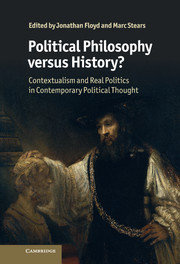 Political Philosophy versus History?
Political Philosophy versus History? Book contents
- Frontmatter
- Contents
- Note on the contributors
- Acknowledgements
- Introduction
- Part I The challenge of contextualism
- Part II The challenge of realism
- 5 Politics, political theory and its history
- 6 Constraint, freedom, and exemplar: history and theory without teleology
- 7 History and reality : idealist pathologies and ‘Harvard School’ remedies
- 8 The new realism : from modus vivendi to justice
- Relative value and assorted historical lessons : an afterword
- Index
- References
5 - Politics, political theory and its history
from Part II - The challenge of realism
Published online by Cambridge University Press: 05 June 2012
- Frontmatter
- Contents
- Note on the contributors
- Acknowledgements
- Introduction
- Part I The challenge of contextualism
- Part II The challenge of realism
- 5 Politics, political theory and its history
- 6 Constraint, freedom, and exemplar: history and theory without teleology
- 7 History and reality : idealist pathologies and ‘Harvard School’ remedies
- 8 The new realism : from modus vivendi to justice
- Relative value and assorted historical lessons : an afterword
- Index
- References
Summary
This chapter seeks to reflect on the differences and relationships between political philosophy, the history of political thought, and the conduct of politics itself. It seeks to sketch out political discourse as a kind of force field constituted by three nodes, identified by three idealised intellectual practices: History, Philosophy and Rhetoric. The kinds of intellectual enterprises that we conduct in the field of politics are characterised by blends of these, inasmuch as perhaps no one ever entirely succeeds in emancipation from the other of these categories. Yet each enterprise has its own distinctive properties, an understanding of which is important to understand their proper and effective conduct.
If we take the study, or writing, of the history of political thought (hereafter HPT) to be a historical exercise, and theorising about politics (hereafter PP) to be a philosophical one, then the relationship between the two becomes an instance or exemplification of the distinction between history and philosophy.
- Type
- Chapter
- Information
- Political Philosophy versus History?Contextualism and Real Politics in Contemporary Political Thought, pp. 105 - 127Publisher: Cambridge University PressPrint publication year: 2011
References
- 3
- Cited by


